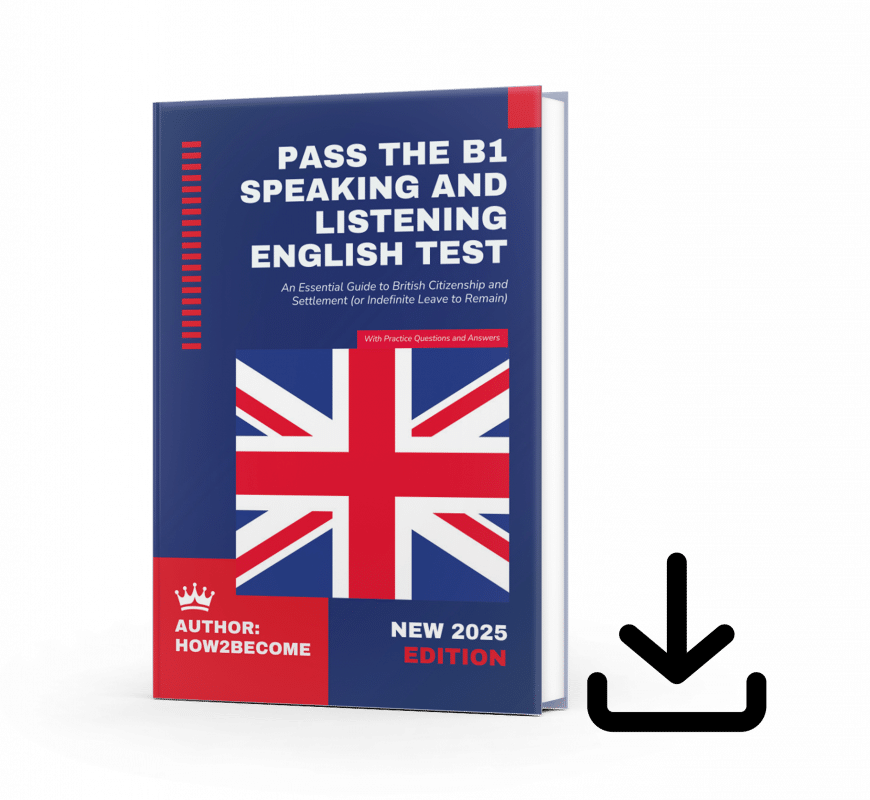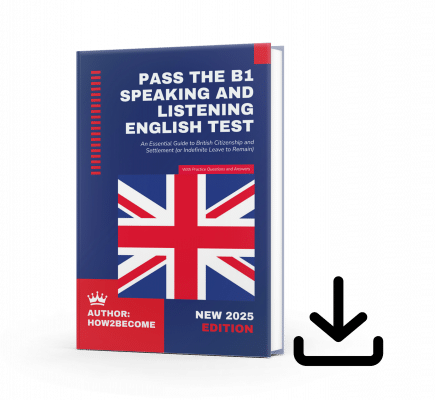Discover how to pass the B1 exam using our award-winning online resources. Get instant access to actionable advice, insider’s tips, and proven training today.
DOWNLOAD NOWHOW TO PASS THE B1 SPEAKING AND LISTENING ENGLISH TEST FOR BRITISH CITIZENSHIP AND SETTLEMENT
Discover how to pass your B1 speaking and listening English test for British citizenship and settlement. The B1 exam checks that your English level matches the descriptions of the CEFR in the Common European Framework. Use our guide to ensure you pass the B1 test with ease.
It will show you how to ace the speaking and listening test, and help secure your visa. It contains a range of invaluable tips on how to prepare for the test, sample practice questions, advice on how to answer, and expert insight into what the assessors are looking for in your B1 Exam!
ABOUT THE B1 SPEAKING AND LISTENING TESTS
The English language speaking and listening B1 exam is an important part of the process if you want to become a permanent resident or a naturalised British citizen. You must pass this test and supply the results as proof of your English language ability in your application. This test is done separately from the Life in the UK test but the results count towards the final assessment. You will need to send the details of your language test result together with the confirmation of the results from your Life in the UK test to the Home Office as part of your application.
There are thousands and thousands of people who take the speaking and listening test for visas every year, but not everyone who takes the test passes. With an attempt costing around £150 a time, this can be very expensive for people who fail and who need to take the exam again. However, if you understand what you need to do, prepare and practise, then you can be confident that you will pass the first time.


B1 FREQUENTLY ASKED QUESTIONS
In 2010 the UK government decided that it was better for society if migrants could speak English as this would promote integration into British society, and also reduce the tax cost for UK residents.
Since that date, there have been many changes to the laws and decisions on who needs to take the test. You need to show that you can speak English to the level decided by the UK government to get the type of visa you are applying for, and your ability is tested in a face-to-face interview. Hence the creation of the B1 exam.
The test checks that your English level matches the descriptions of the B1 CEFR in the Common European Framework. This is the level that has been decided that people need to reach to be given citizenship or settlement. When you have passed this test then the authorities will accept that you are able to use and understand language of this level and you will have satisfied this part of the visa application process.
You may be asking yourself: ‘What will the examiner use to check how well I speak English?’
If you are applying for a visa for indefinite leave to remain, also known as ‘settlement’, or applying for British citizenship, also known as ‘naturalisation’, then you will be an ‘Independent User’ and will need to take a test at the CEFR B1 level. The CEFR, which stands for ‘The Common European Framework of Reference for languages, is an international guide by the Council of Europe. It is used to describe the language ability of learners and is used by the examiners to judge your English level. This standard is recognised by governments, universities and employers as a clear and objective way to rate a learner’s skills in different languages. It is used all over the world.
The format of the speaking and listening test is different for the IELTS Life Skills test and the Trinity GESE test. Results from both tests are accepted by the UK government as proof of your ability to speak English to the required level, the B1 CEFR level.
It is important that you show that you are able to use and understand the language given in the specifications at the B1 level. The examiner will listen carefully to what you say and will probably match your language against a checklist they have in front of them to see how closely similar it is. This checklist is based on the language required for the level you are taking and so it is this that you need to demonstrate.
So, basically, to do well you have to make sure that you cover what is in the requirements and use the language that the examiner is looking for! The examiner will also be looking at how clearly you speak, how well you interact, how well you can understand and how well you can express yourself.
There are different tasks to be completed in the Trinity GESE Grade 5 Test and in the IELTS Life Skills test. The number of tasks you have to do in each test differs too. However, both tests are based on the descriptions of an Independent User in the CEFR and it is this that you need to match.
The B1 test booking fee costs £215 per attempt. Ensure that you know what is being asked of you before taking the B1 test, so that you are 100% prepared to pass.
B1 ENGLISH TEST TOPICS – THE IELTS LIFE SKILLS TEST
This section will give you some information about this test and what you have to do in the interview. You can take this exam in many parts of the world. The result is either pass or fail. If you receive a fail, then you cannot use the test result in your application for a visa.
This test lasts a total of 22 minutes. However, you will not be expected to talk all that time as you will go into the interview room with another test taker and share the time given. You may ask why you have to be with another test taker. The reason given is that the test will judge your skills at communicating with another person and at having a discussion. The examiner has the job of judging the language skills of both of you at the same time. This test is broadly divided into just two sections but there are five different tasks that you will have to do and be ready for:
In the first part, you will:
- Ask and answer personal questions (up to 3 minutes);
- Give a short talk and ask questions (up to 7 minutes).
In the second part, you will:
- Listen to two different recordings and answer some questions (up to 5 minutes);
- Plan an activity (up to 3 minutes);
- Ask and answer questions about a specific topic (up to 4 minutes).
TRINITY GESE GRADE 5 TEST
You can only take this exam at one of the approved centres in the UK. This test is not offered in any other countries. You will receive your result on the day immediately after the test but should wait for around 7 days to receive the formal confirmation. If you receive a fail then you cannot use the test result in your application for a visa.This test lasts a total of 10 minutes. This test is different from the IELTS Life Skills test as there will just be you and the examiner in the interview room. The examiner will talk to you and will judge your language skills against the B1 criteria. However, in this test the examiner will be specifically checking to see if you can do the following in particular:
- Talk about future plans and what will happen
- Say what you prefer
- Talk about recent events and experiences
- Give reasons
- Say how long events and experiences lasted
- Say how much and how many
Try to use language that covers these points in your topic and conversation as much as you can. To get a pass you only to need to give a short talk about a topic that you choose, respond to questions as clearly and as well as you can and ask a few questions. The examiner will want you to do as well as you can and so will very probably be pleasant and helpful to you. This test has two parts: a topic of your choice and a conversation about two different subjects.
THE B1 INTERVIEW
The more you practise before the interview, the more prepared you will be and then the more confident you will feel. If you do not speak regularly in English then make an effort to go out and practise by speaking to people. One way to do this is to go into shops and ask for information. Ask family members at home who speak English well to speak to you only in English and not in your native language. Instead of watching television channels in your own language, choose to watch programmes in English, even if it’s just for a short time each day.
If you have lived and worked in an English-speaking country for many years, then you are very probably communicating at B1 level already. However, knowing about what is expected of you in the exam will help you to do very well with a minimal effort.
Below is some advice on how to improve the areas the examiner will be checking for.
Your range of words
You will need to talk about topics from your everyday life and use a range of words to do this well. You may at times make some mistakes with the words you use and this is perfectly fine in the interview. At B1 level the examiner will allow for a few mistakes. However, if you make many mistakes then of course you will not give a very good impression to the examiner. So try your best to use the words in their correct form.
The examiner will be looking to see if you can use a variety of words to talk about the everyday topics that will come up in the test. This does not mean that you have to use a very wide range of words or that the words you use will have to be very complicated. Remember, this is an elementary exam so the examiner will not expect a very high level of vocabulary from you. However, the better the variety and range of words you use, the more you will impress the examiner.
Your pronunciation
The examiner will be checking that you can speak in English in a way that people can understand you, and ideally, the first time you say something. This does not mean that you should not speak with a foreign accent of course. The examiner will allow for accents from different countries and even expect this, especially if they find that you have not lived in an English speaking country for a long time.
However, if you have noticed that often people do not understand what you say, or people have told you that your strong accent is difficult to follow, then you should try to work on your pronunciation before the exam.
You may sometimes not pronounce individual words correctly. This is expected and this will not affect your test result. It’s very difficult to know how to say every word in a foreign language correctly, especially when you haven’t heard or used them very often. During the interview, try to speak a very little more slowly than you usually do and pronounce the words as clearly as you can. You are not expected to speak at a fast speed so it’s better to slow down a bit and focus on speaking clearly and well.
The examiner will be listening to how easy you find it to say what you want to say and to express yourself. You should be able to use sentences that are sometimes short and sometimes quite long but are not very complicated. It’s better not to be too ambitious and try to use long sentences with complicated grammar that you are not confident about. Keep to sentences that you use often and just focus on trying to say them clearly with few grammar mistakes.
You should be able to keep going when you talk. The examiner will especially be looking at this when you have to give your short talk in the test. At times you can stop and pause, but you should be able to keep talking without much help from the examiner. If you find it difficult to remember what you wanted to say, you can’t think of the words or how to say something, then leave that point and go on to the next thing you wanted to say. It doesn’t matter if you forget words or what you wanted to say sometimes as long as you can continue to speak and do not come to a complete stop
Your accuracy
The examiner will not expect you to speak perfectly and without making any mistakes. However, the meaning of what you say should be quite clear and not cause the listener, who is the examiner or the other test taker if there is one with you, to have any problems understanding you. As we saw before, the subjects are ones that you often meet in your daily life such as the family, travel and transport so you should be able to talk quite confidently and be able to fully show the examiner how accurate your grammar is.
If you find that people do not always understand you when you speak in English, this may be because you are not using the language correctly. You can try to improve your grammar by doing some grammar exercises you can find in books or on the internet on particular grammar points that you find difficult. Reading is a known way to improve grammatical accuracy. Try to read as much as you can before the test. You can read anything that you are interested in. If you don’t have much time, then choose short articles from easy to read newspapers such as the free newspapers. As you read, try to pay attention to how the sentences are formed.
For more ways to ace the assessment, check out our comprehensive guide!
After you receive your confirmation of your test date and time plan out your route to the test centre carefully. Look at how much time you will need to reach the centre. You will need to be at the test centre 30 minutes before your interview. It is very important that you are not late or else you will miss your time slot and may need to book, and pay for, another test. A good idea is to research the location of the test centre days before your interview. Check how long it will take you to get there and what’s the easiest transport to use. Will you need a place to park your car if you take one? Find out about parking spaces nearby and how much you need to pay so you are fully prepared.
Make sure that you have all the correct documents such as your passport to take. Try to have them all ready before the day so you are not slowed down by searching for them in a panic in the morning.
During the Interview
The exam will be held in very secure conditions and you will probably have limited access to your mobile. This is quite normal and nothing to worry about. However, do be ready for security checks such as the checking of your documents.
You need to reach a certain level of English language ability to be given a pass grade and will need to show this to the examiner. During the spoken test the examiners will be listening carefully to assess your language and listening skills. They will want to see if your English skills match the language requirements of B1. If you try to relax and be ready to interact with the examiner and the other person in the room, then you will more likely be able to show the examiner what you can do in English. During the test the examiner will probably look at a checklist to see how closely your English level matches. The examiner may have this list on the desk in front of them and look at it during the test. However, you do not need to worry about what the examiner is doing during the test, but just need to focus on speaking as well as you can.
What are the questions like?
Below you will find some typical questions at this level, the B1 level, the examiner or the other test taker may ask you. These questions are intended to help you to judge your skills in answering them, and give you an idea of the level of difficulty of the questions in the exam.
Questions on the past:
• Where did you arrive in this country?
• When were you born?
• Where did you used to live when you were a child?
• What did you do yesterday?
• What were your hobbies when you were a child?
• What did you do with your family last weekend?
Questions on recent events and experiences:
• How long have you lived here?
• Have you visited any interesting places recently?
• Have you done anything interesting recently?
• Where have you been since you arrived in the UK?
• What cities or towns have you visited here?
Questions to ask for explanations:
• Can you explain this to me?
• What do you mean?
• What do you mean by that?
• What is the meaning of that?
• Can you give me an explanation?
MAIN PRODUCT FEATURES
In Pass The B1 Speaking and Listening English Test, we have covered ALL of the B1 English test topics this information, and much more. Our book is the NUMBER 1 resource for anyone hoping to pass the assessments. Absolutely crammed with amazing tips, this is the ideal preparation for your B1 exam. The topics include:
- CHAPTER 1: Your Assessment
- CHAPTER 2: Preparing for the B1 Tests
- CHAPTER 3: Exam Language
- CHAPTER 4: Speaking
- CHAPTER 5: Listening
- CHAPTER 6: Grammar and Vocabulary Essentials
- CHAPTER 7: Topic Discussion
- CHAPTER 8: Practice Exercises
- CHAPTER 9: Final Thoughts
IN OUR GUIDE, YOU’LL FIND:
- Fantastic preparation tips and advice;
- An insight into what the assessors are looking for;
- In-depth language practice, to help you master the secrets of the English language;
- A range of typical interview questions and answers, along with interactive exercises, to help you get to grips with the skills required.
FREE BONUS
Download your copy today and you’ll receive the following free bonus:

LIFE IN THE UK ONLINE TESTING SUITE
- 30-days free access to the life in the UK online testing suite;
- Thereafter, this service is charged automatically at just £5.95+vat per month;
- No minimum term;
- You may cancel anytime by contacting info@how2become.com;
- If you cancel before the 30-days are up you will not be charged.
£7.14 Value, Yours FREE
✓ 30-Day Money-back Guarantee
Did you know? All orders with How2Become are protected by our 30-day money-back guarantee. What ever the reason…or no reason at all…you can have your money back if this resource isn’t right for you (see our terms for full details).


